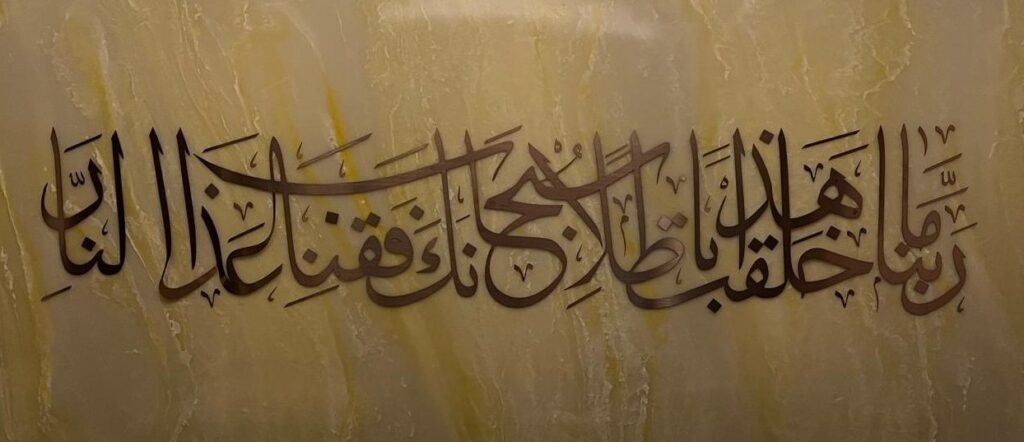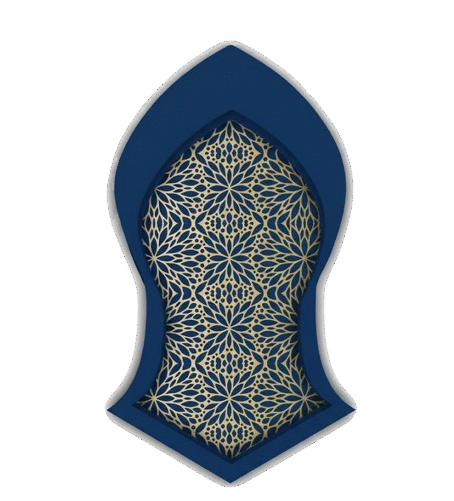Inspirational Men&Women In Islam
Lady Asiya Bint Muzahim (AS) – The Wife of Pharaoh
Asiya Bint Muzahim (AS) was the wife of Pharaoh (Fir‘awn) of Egypt during the time of
Prophet Musa (Moses, peace be upon him). Asiya (AS) was born into a noble and
wealthy family in ancient Egypt. She grew up in a life of luxury and privilege, surrounded
by the riches of the royal palace. Her beauty, intelligence, and noble character made her
one of the most admired women of her time. Eventually, she became the wife of
Pharaoh, the king of Egypt. Despite living in an environment of power and wealth, Asiya
was kind, compassionate, and humble – such qualities that later guided her towards
faith in Allah.
Honoured Among the Greatest Women in Islam
She is honoured in Islam as one of the greatest women ever to live, and she is
mentioned in the Qur’an for her steadfast faith. When Pharaoh opposed the message of
Musa and committed great injustice, Asiya rejected his falsehood and believed in the
Oneness of Allah. Because of her faith, she was tortured by Pharaoh, yet she never gave
up her belief.
In the Qur’an, Allah describes her prayer:
“And Allah presents an example of those who believed: the wife of Pharaoh, when
she said, ‘My Lord, build for me near You a house in Paradise and save me from
Pharaoh and his deeds and save me from the wrongdoing people.’” (Qur’an 66:11)
In this verse, Allah praises Asiya’s faith, patience, and courage. Even though she lived
under the rule of one of the most powerful and oppressive men, she chose to believe in
Allah and asked for Paradise. Through these verses, Asiya is honoured for her
compassion, wisdom, and strong faith in Allah, despite living in the palace of a tyrant.
Her life is a symbol of courage, patience, and faith in the face of oppression. She is
considered one of the four greatest women in Islam, along with Maryam (Mary),
Khadijah bint Khuwaylid, and Fatimah al-Zahra.
The Prophet Muhammad (peace be upon him) described Asiya as one of the four
greatest women in Islam. This is mentioned in well-known hadith:
“The best of the women of Paradise are: Khadijah bint Khuwaylid, Fatimah bint
Muhammad, Maryam (Mary) daughter of Imran, and Asiya, the wife of Pharaoh.”
(Sahih al-Bukhari and Sahih Muslim)
“Among the women who perfected their faith were Asiya, the wife of Pharaoh, and
Maryam, the daughter of Imran.”
(Sahih al-Bukhari)
“Many men reached perfection but none among the women reached perfection
except Mary, the daughter of Imran, and Asiya, Pharaoh’s wife. And the superiority
of Aisha over other women is like the superiority of Third over other kinds of food.”
(Al-Bukhari)
These hadith praise Asiya for her steadfast faith, courage, and resilience, despite the
harshness and oppression she faced under Pharaoh. She is regarded as one of the
greatest women in Paradise due to her unwavering devotion to Allah.
Asiya’s Marriage to Pharaoh
In ancient Egypt, royal marriages were often arranged with women from powerful or
respected families to strengthen the king’s position. Asiya’s qualities made her an ideal
match for Pharaoh, and she was selected to live in the palace as queen.
Asiya (AS) was married to Pharaoh, the ruler of Egypt, and became his queen. Their
marriage granted her high status, wealth, and luxury in the royal palace. However,
Pharaoh was a proud and cruel man who oppressed others and claimed to be a God.
Although she was his wife, Asiya never accepted his false beliefs or his tyranny. Instead,
she remained kind, humble, and just. Her marriage was a great test of faith because she
had to live beside a powerful oppressor while secretly believing in Allah. In the end, her
faith led her to stand up against Pharaoh’s injustice, even though it caused her to be
punished for her belief.
The Role of Musa (Moses) in the Life of Asiya
Asiya Rescued Baby Musa from the River. When Pharaoh ordered that all newborn
Israelite boys be killed, the mother of Musa placed him in a basket in the river, trusting
Allah’s promise to return him. The Qur’an tells us:
“Then the family of Pharaoh picked him up, that he might become for them an
enemy and a source of grief. Indeed, Pharaoh and Haman and their soldiers were
deliberate sinners.”
(Qur’an 28:8)
It was Asiya who saw the basket and felt compassion for the baby. Despite Pharaoh’s
initial refusal, Asiya pleaded with him to spare the child’s life. She said:
“[She said] ‘A comfort of the eye for me and for you. Do not kill him; perhaps he may
benefit us, or we may adopt him as a son.’”
(Qur’an 28:9)
Asiya Witnessed Musa’s Prophethood
Years later, when Musa returned to Pharaoh as a prophet and challenged his tyranny,
Asiya recognised the truth of Musa’s message. She saw the miracles Allah gave him (like
the staff turning into a snake, and his hand shining with light). Her heart believed, even
while living in Pharaoh’s palace, surrounded by arrogance and disbelief. Asiya’s faith in
Allah increased because of Musa’s mission. She saw his courage and trusted the
message he brought.
Her Faith Led to Her Martyrdom
When Asiya declared her belief in the One God and rejected Pharaoh’s tyranny, Pharaoh
became enraged. He wanted to force her to abandon her faith. Islamic narrations (from
scholars such as Ibn Kathir and others) tell us that:
• Pharaoh ordered that Asiya be tied up under the blazing sun.
• He commanded his soldiers to nail her hands and feet to the ground or to a
wooden plank (according to some narrations).
• She was left in the scorching heat with large stones placed on her chest to
increase her suffering.
But as she was being tortured, Allah showed her a vision of her house in Paradise. This
vision filled her with peace and happiness, and she began smiling and laughing despite
the pain. Pharaoh’s men were shocked at her reaction.
It is narrated that when Pharaoh saw her smiling, he became even more furious and
ordered a large rock to be dropped on her to crush her—and that is how she passed
away as a martyr (shaheeda).
A Symbol of Faith in the Midst of Tyranny
Asiya’s most powerful legacy is her unshakable faith in Allah while living in the palace of
the greatest tyrant of her time—Pharaoh. Despite being surrounded by disbelief,
arrogance, and oppression, she believed in the message of Prophet Musa (Moses,
peace be upon him) and rejected Pharaoh’s false claim of divinity. She proved that faith
is not determined by one’s environment—even in a place of extreme disbelief, a heart
can be full of iman (faith). She is a role model for anyone striving to hold onto faith
despite difficult surroundings.
A Role Model for Women (and Men) of Patience and Courage
Asiya was not just patient; she was brave. She openly defied Pharaoh’s demands to
abandon her belief, knowing it would lead to torture and death. Islamic narrations
describe how Pharaoh ordered her to be tortured, yet she remained steadfast, smiling
as Allah showed her place in Paradise while she was being punished.
Her legacy shows that true strength lies in the heart. She teaches us that standing for
truth sometimes requires sacrifice—and that no earthly power can harm the soul of one
whose heart is with Allah.
A Message of Hope for the Oppressed
Asiya’s life and story are a source of comfort for the oppressed and suffering. Her story
tells us that even if we are powerless in this world, we can be among the most honoured
with Allah. She proves that:
• Wealth and power in this world mean nothing without faith.
• Faith can flourish even in the harshest conditions.
• Salvation and reward are with Allah, not in worldly success.
Muslim scholars often cite her story when encouraging believers facing injustice,
especially women living in oppressive circumstances, to hold onto hope and trust in
Allah’s justice.
A Spiritual Legacy: Prioritising the Hereafter Over This World
Perhaps the most profound lesson from Asiya’s life is her focus on the Hereafter.
Despite having palaces, wealth, servants, and royal status, she did not ask Allah to save
her worldly kingdom—she asked for a house near Allah in Paradise.
Her legacy teaches believers to long for closeness to Allah over worldly comforts. She
shifted the focus from temporary luxury to eternal joy with Allah, inspiring Muslims to
prioritise their faith and akhirah (Hereafter).

Women in Islam: The Legacy of Khawla bint al-Azwar:
Khawla bint al-Azwar: A Fearless Pioneer of Faith and Strength
Introduction
Khawla bint al-Azwar was a 7th-century Muslim warrior from the Bani Asad tribe who earned a legendary reputation for her bold courage and unwavering faith. At a time when women were expected to remain in domestic roles, Khawla chose a different path. She trained in sword fighting with her brother, fought in key battles like Yarmouk, and carried wounded soldiers to safety. Her actions challenged societal norms and proved that leadership and strength are defined by purpose—not by gender or rank.
Khawla remains a powerful figure in Islamic history because she broke through cultural barriers, inspiring generations of Muslim women to step forward with courage and conviction. Her story continues to show that anyone, regardless of background, can rise as a leader and a protector of their faith and community.
A Strong Foundation: The Early Life of Khawla bint al-Azwar
Born into a respected family, Khawla was the daughter of a well-known leader from the Bani Asad tribe. Her family embraced Islam early on and supported its spread throughout the Arabian Peninsula. She shared a close bond with her brother, Dhiraar, a warrior and poet celebrated for his bravery. Khawla often accompanied him, learning from his experiences and receiving training in swordsmanship—uncommon for women of her time.
In addition to her martial skills, Khawla also studied poetry, a prized tradition in Arab culture. Though described as slim, brunette, and graceful, what truly set her apart was her intelligence, determination, and inner strength. These qualities laid the groundwork for her emergence as a fearless defender of Islam.
Strength and Compassion: The Character of Khawla bint al-Azwar:
Khawla’s character was defined by resilience, deep faith, and a powerful moral compass. She was known for her courage and determination, always standing firm in the face of hardship. Her loyalty to her family, commitment to Islam, and passion for justice were at the heart of who she was.
Her strength, however, wasn’t limited to the battlefield. She was also wise, compassionate, and deeply caring. Whether helping the wounded or encouraging fellow warriors, she remained true to her values. Khawla’s life embodied the balance between might and mercy—making her an enduring symbol of integrity, leadership, and faith-driven action.
A Bond of Strength: Khawla bint al-Azwar and Khalid ibn al-Walid:
Khawla and Khalid ibn al-Walid—one of Islam’s most esteemed military commanders—shared a mutual commitment to defending their faith and community. Though from different backgrounds, their dedication brought them together on the battlefield.
During the Battle of Yarmouk, Khalid witnessed Khawla fighting bravely in disguise. So impressive were her skills that her identity remained unknown until after the battle. When Khalid learned she was a woman, he didn’t discourage her; he respected her courage and allowed her to continue fighting alongside the army. Their story reflects mutual respect and highlights how true strength is recognized regardless of gender.
Battles and Heroic Exploits: Khawla bint al-Azwar’s Military Engagements:
- Battle of Sanita al-Uqab (634 CE):
Khawla first gained recognition at this battle, part of the Siege of Damascus. After her brother Dhiraar was captured by Byzantine forces, she put on armor and led a daring attack that helped rescue him and others. - Battle of Ajnadayn (634 CE):
Initially tending to the wounded, Khawla took up arms after learning of her brother’s capture. Disguised in full armor, she fought so skillfully that some mistook her for Khalid ibn al-Walid himself. - Battle of Yarmouk (636 CE):
Perhaps her most famous moment came on the fourth day of Yarmouk, where Khawla led a group of women in battle and defeated the enemy’s commander. Her leadership was praised as heroic and rare. - Campaigns Across the Levant:
Beyond the major battles, Khawla joined military campaigns across Palestine, Syria, and Jordan. She often rallied troops during retreats and turned the tide with her leadership and fearlessness. - Captivity and Resistance:
After being captured when her horse was injured, Khawla and a group of women were held by Byzantine soldiers. Using tent poles as weapons, they fought back fiercely, killed several guards, and escaped—turning their captivity into victory.
Breaking Boundaries: Khawla bint al-Azwar’s Impact on Society:
Khawla reshaped how women were perceived in her time. When women were largely confined to domestic roles, she proved they could be warriors, leaders, and protectors of their communities. Her example challenged outdated views and opened doors for Muslim women to contribute actively to society and faith.
Her bravery gave others confidence to believe in themselves and their purpose. She proved that strength comes from conviction, and that women can stand equally on the frontlines of both battle and belief. Khawla’s legacy is a powerful reminder that the contributions of women are vital and enduring in Islamic history.
Defender and Caregiver: Khawla’s Devotion to Islam:
Khawla’s commitment to Islam extended beyond fighting. She also cared deeply for her fellow Muslims. During battles, she carried injured soldiers to safety, tended their wounds, and made sure they were looked after. Her compassion reflected the Islamic values of mercy and brotherhood, even in the chaos of war.
Her actions showed that true service to Islam is not just about strength, but also about kindness and support. Whether defending justice or aiding the wounded, Khawla lived the teachings of Islam through every action. Her life remains a powerful example of faith in practice—brave, compassionate, and steadfast.
Khawla bint al-Azwar: The Warrior Woman of Early Islam:
Conclusion
Khawla bint al-Azwar was a brave and faithful woman who made a big impact in the early days of Islam. She fought in battles, helped the wounded, and showed that women could be strong leaders too. Her courage, kindness, and deep belief in her faith inspired many during her time—and still inspire people today.
Her story teaches us that true strength comes from having a purpose and standing up for what is right. Khawla’s life is a powerful reminder that anyone, no matter their background, can make a difference through courage, faith, and determination.

